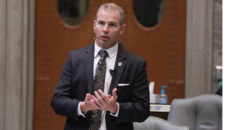There’s a simple reform that can make our communities safer, eliminate unnecessary government bureaucracy, and put Missourians back to work across the state. In states like Pennsylvania, Michigan, Oklahoma, and Utah, relief is available to everyone in the state automatically, but herein Missouri the process is a tangled, bureaucratic mess.
That policy is Clean Slate automatic criminal record expungement. With the support of my colleagues from both sides of the aisle, I plan to introduce legislation this session to make it the law here in Missouri.
Clean Slate would automatically seal records of low-level offenses after a person remains crime-free for several years. It removes barriers to employment, housing, and education, giving people who have a turned their lives around a fresh start. Legislatures in red and blue states alike have enacted these common-sense laws with great results for public safety and for economic development.
We’re not creating a new system—we’re just opening it up to make sure everyone can benefit. Missouri already has a process to allow people to petition to have their records sealed, but it’s a complex bureaucratic knot that few people are able to untangle. Right now, just one percent of eligible Missourians have been able to complete the process. That’s the definition of broken, inefficient government, and we have the chance to fix it.
Automating the process makes it accessible to all Missourians, regardless of whether they have the means to hire a lawyer, or the time and resources to fight through the bureaucracy for months or even years.
This isn’t a get-out-of-jail-free card. To qualify, people must serve their full sentence, and remain crime-free for 3 years for eligible misdemeanors or 5 years for eligible felonies. We know from rigorous studies that people who remain crime-free are no more likely to commit a crime than people without a criminal record. And the opportunities Clean Slate provides—making it easier to get a job, find stable housing, and go back to school—make it less likely that a person will commit another crime.
Missouri employers are desperate to fill positions left open by the worker shortage crisis faced by businesses large and small across our state. We must address this need by getting government out of the way of Missourians who have done their time and want to find work and provide for their families.
Clean Slate would only apply to people convicted of lower-level offenses that the legislature has already established as eligible for expungement. Serious, violent, or sexual offenses would be excluded. And while these records would be sealed, they would still be available to police, sheriffs, and other law enforcement agencies.
Clean Slate exemplifies Missouri values: the dignity of work, the value of second chances, and the need to help people who are struggling.
We all know people who have made mistakes and worked to turn their lives around. They’re our friends, family, and neighbors. They’re next to us in the pews at church and in line at the coffee shop. They want to find a job and a good home for their children. They want to go back to school and get the degree that could help them advance. They’ve already paid their debt to society, but that record throws up barriers at every step.
They’ve earned a second chance. We have the obligation and the opportunity to extend it to them.
Clean Slate gives everyone the same chance at a fresh start, not just the few who can afford it under current law. It expands our workforce at a time when businesses are struggling. It boosts our economy when it’s needed most.
We urge our colleagues to come together to live up to our values, keep our communities safer, and support our friends and neighbors, with a Clean Slate.







